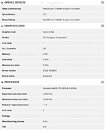Friday, May 22nd 2020

Intel Tiger Lake Processor Spotted with Boost of 5 GHz
Intel is preparing to launch its next-generation Tiger Lake lineup of processors for the middle of 2020. The processors are based on the new "Willow Cove" CPU core, which supposedly brings even more IPC gains compared to previous "Golden Cove" CPU cores found in Ice Lake processors. The Tiger Lake lineup will use Intel's advanced 10 nm+ manufacturing process. This alone should bring some gains in frequency compared to the 10 nm Ice Lake processor generation, which was spotting a maximum of 4.1 GHz boost frequency on 28 W TDP model named Core i7-1068NG7. This processor is labeled as the highest-performing Ice Lake parts available today and the best 10 nm products available so far from Intel.
Thanks to the popular hardware leaker Rogame, we have evidence that the gains from 10 nm+ manufacturing process are real and that Tiger Lake will show us an amazing boost frequency of 5 GHz. In the benchmark, an unknown OEM laptop was spotted running the benchmark with a Tiger Lake CPU. This CPU is a 4 core, 8 threaded model with a base frequency of 2.3 GHz and a surprising boost frequency of 5 GHz. This information should, of course, be taken with a grain of salt until we get more information about the Tiger Lake lineup and their specifications.
Source:
@_rogame (Twitter)
Thanks to the popular hardware leaker Rogame, we have evidence that the gains from 10 nm+ manufacturing process are real and that Tiger Lake will show us an amazing boost frequency of 5 GHz. In the benchmark, an unknown OEM laptop was spotted running the benchmark with a Tiger Lake CPU. This CPU is a 4 core, 8 threaded model with a base frequency of 2.3 GHz and a surprising boost frequency of 5 GHz. This information should, of course, be taken with a grain of salt until we get more information about the Tiger Lake lineup and their specifications.

25 Comments on Intel Tiger Lake Processor Spotted with Boost of 5 GHz
moved to 10nm. Even though the first batch will have some problems, i think through refinement they would have a better
product overall with better IPC, thermals, power etc. My opinion anyways i didn't follow the 10nm issues that plagued intel.
All I see here is they finally managed to shrink 14nm. And what do we get? Yet more Core. Old news on a new node...
Yields on 10nm+ are good BTW.Yeah…
Good for short benchmarks, not so good for the user experience. But this is the case for most low-TDP laptop CPUs these days.
If this is true then next yr might be a very competitive yr for both companies.
Renoir must be even faster:
www.guru3d.com/articles_pages/intel_core_i9_10900k_processor_review,7.html
www.techspot.com/article/1876-4ghz-ryzen-3rd-gen-vs-core-i9/
They have a great showing in CineBench yes (due to its favourable nature to team red also quite appropriately called RyzenBench), but you don't do that whole day, do you? Also, since TechSpot (HardwareUnboxed) are leaning quite a bit towards being AMD biased, they convenitently "forgot" to include power figures at said 4 Ghz, since they would be quite surprising...
You can literally look up pretty much any youtube review on Zen 2 vs intel and it will show that the IPC is better on the AMD, the only reason Intel might show a higher single digit score is because of a much higher clock speed eg 5.0GHz vs 4.3Ghz and in games like I said its higher clock speeds and lower latency and the ring bus architecture of Intel CPUs that give them the edge, everything else its AMD and at lower clocks.
Im actually stunned there are people here that still dont know this o_O
Even if it were true, not much of an achievement for AMD, to finally develop an architecture in 2019 that competes with Intel's 2010 architecture, or OK, 2015 update, if you want to get technical.
And it's not good for us, as buyers, in the end.
PS. Also, HardwareUnboxed is not really the most reliable, they are quite biased, not necessarily towards AMD, but rarely have I seen anything truly objective coming from them. They have their likes and dislikes and seem to stick with them in their reviews. Plus, they seem to eat up the pseudo technical marketing stuff without truly understanding it.
Ice Lake was based on Sunny Cove not Golden Cove.
Golden Cove is what is coming after Willow Cove (Rocket Lake) and will be in Meteor Lake.
would like to see that benchmark :)